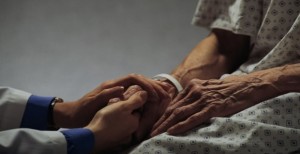 Pope Benedict writes in Spe salvi, “The true measure of humanity is essentially determined in relationship to suffering and to the sufferer.” These words recently took on new meaning for me as I encountered the story of Edwarda O’Bara, who passed away at the age of 59 in late November.
Pope Benedict writes in Spe salvi, “The true measure of humanity is essentially determined in relationship to suffering and to the sufferer.” These words recently took on new meaning for me as I encountered the story of Edwarda O’Bara, who passed away at the age of 59 in late November.
In January 1970 Edwarda slipped into diabetic coma. As consciousness faded the teenager turned to her mom, Kaye, and pleaded, “Promise me you won’t leave me.” In response, Kaye O’Bara reassured her daughter, “Of course not. I would never leave you, darling.” Sadly, Edwarda never came out of that coma and so for 35 years, until Kaye’s death in 2005, she remained by her daughter’s side as primary caregiver.
After Kaye died, Edwarda would continue to need medical and normal comfort care and so her sister Colleen would carry on her mother’s promise saying, “I didn’t give it a second thought. She’s my sister and I love her.” Their love was unassuming even as it was exemplary. Their compassion was true compassion. They lived, Pope Benedict’s recent words: “Indeed to accept the ‘other’ who suffers, means that I take up his suffering in such a way that it becomes mine also.” Their response of true compassion and love flies in the face of modernity’s reaction to the suffering, sick, and disabled.
Today, such a response is scoffed at as the life of Edwarda is considered a burden, of poor quality, and certainly would not merit valuable resources. Many respond to such a story by turning to a family member or friends with “I would never want to be like that. Put me out of my misery.” End of discussion—euthanasia is deemed the only course of action. But euthanasia is an anti-life and anti-love response that is anything but compassionate and fails to recognize, as Edwarda’s mom and sister did, that every life is worth living. As the Church’s Declaration on Euthanasia states, “believers see in life something greater, namely, a gift of God’s love, which they are called upon to preserve and make fruitful.”
Kaye and Colleen recognized Edwarda’s dignity and responded. They gave her precisely what she needed, “love, the human and supernatural warmth with which the sick person can and ought to be surrounded by all those close to him or her, parents and children, doctors and nurses.” (Declaration on Euthanasia, II)
In his encyclical, Salvifici doloris Blessed John Paul II taught that as Christians we are called to become a Good Samaritan by cultivating a disposition of the heart—a sensitivity to the one who endures misfortune. But this disposition is a first movement of compassion that is fulfilled in action. Sympathy, compassion, and love become an incentive to come wholeheartedly to the aid of the person in need. Compassion and sensitivity to suffering encourages the Christian to make of oneself a gift to the other to effectively meet the needs of the one who suffers. As John Paul wrote in Salvifici doloris, “the world of human suffering unceasingly calls for…that unselfish love which stirs in his heart and actions (29).” Do not Kaye and Colleen exemplify the very meaning of a “lived theology?”
As an exaggerated notion of autonomy and utilitarianism tighten their grasp on the West, the culture of death sees a waste in such a gift of self. But the ones who respond, who “give birth to works of love” do not experience life as wasted. They find their lives to be blessed and see in the one they suffer with a blessing and joy. They experience what Pope Benedict describes as a “path of purification and growth of maturity.” To be sure, it is not easy to suffer with others. But at the end of the day the reward is far greater than the cost. Upon Edwarda’s death, Colleen expressed this very sentiment: “She taught me so much about unconditional love, she taught me about patience, that I didn’t have before. I learned so much from taking care of my sister. It’s like I grew up overnight.”
Kaye and Colleen gave beautiful witness to the kind of response that is owed to all who are sick and who suffer. They embraced their family member and in so doing they gave witness to and experienced the transforming power of love. The true measure of a person is determined by how he responds to one who suffers misfortune. Kaye and Colleen, measure taken. Edwarda’s life was a true blessing, indeed.
This article was originally published at Crisis Magazine and is reprinted with permission from the author.



